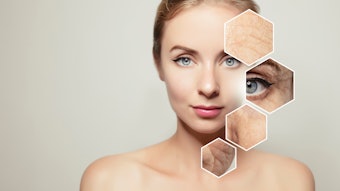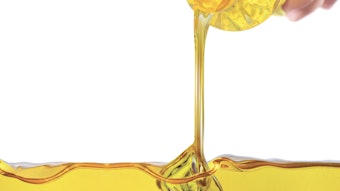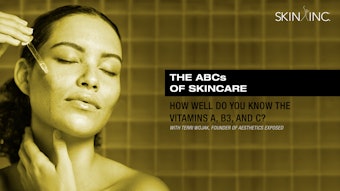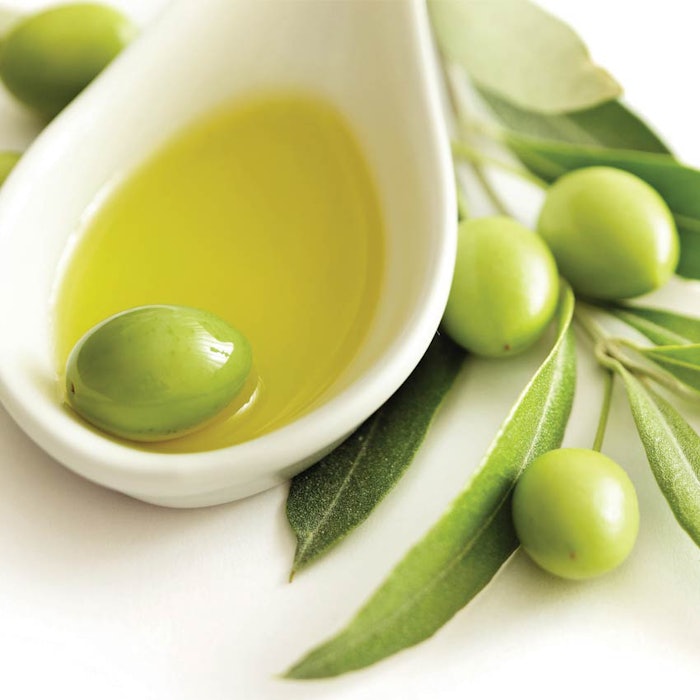
In the presence of a master, time stands still. I remember my training with Vasant Lad, M.A. Sc., discussing the phases of illness. He shared that according to Vedic knowledge, illness passes through six stages. Up through the first four—accumulation, provocation, spreading and deposition—the disease can be reversed and health returned. Yet in stage five and six—manifestation and complication—one can only treat or maintain the illness itself.
The primary prescription for any imbalance—physical, mental, emotional or spiritual—was a lesson that has remained with me for years. The primary treatment for any disease was first warm oil massage. Through massaging the body with oil, lymph activates, tissues eliminate toxic build-up, joints are lubricated, muscle is smoothed, the mind is calmed and the entirety of the person is engaged and restored. This is the power of plant oils for total health.
Ancient Skin Care Wisdom
People have pursued healthy, youthful skin since ancient times. Throughout ancient cultures, people turned to natural oils to preserve vitality and beauty, while also supporting the total health of their bodies by keeping all aspects of their health in balance. In ancient Egypt, beauty and self care were so important that body oils for daily use were included in the wages of even the lowliest workers. Jars have been found in even the most humble tombs containing the remnants of over 21 different oils for cosmetic use, including olive oil, sesame oil and coconut oils. Beauty rituals served as an honor to gods and goddesses, to keep skin youthful and glowing in a harsh desert climate, and to maintain the health of the body inside as well as outside.
The ancient Greeks considered olive oil sacred. They anointed themselves with it to protect against the sun and mixed it into facial masks to clear complexions. Women applied oil after bathing as a moisturizer and cleanser, and men rubbed themselves with oil before exercising or going into battle. When the Greeks invaded Egypt, Alexander the Great pressured Egyptian priests to divulge the secrets of sacred Egyptian oils. The priests shared only false information and half truths, to keep this sacred knowledge from falling into the wrong hands.
The 5,000-year-old Indian healing tradition known as Ayurveda also uses oils to support inner and outer beauty and health. According to Ayurvedic traditions, people are made up of five essential elements—space, air, fire, water and earth. Every person’s body tends to one of three doshas, which may change over time or with changes in diet or environment. These doshas are vata (air + space), pitta (fire + water) and kapha (water + earth). The key to whole health is maintaining the balance of these elements in the body. This is achieved through the use of natural oils, which encourage or balance out these different elements.
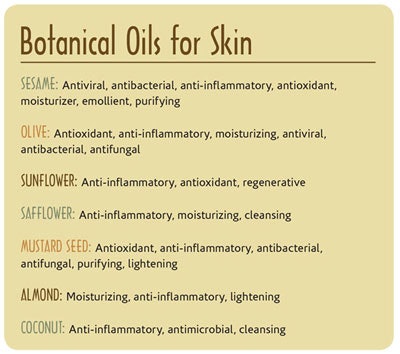
Today, many Western estheticians and massage therapists are turning to the wisdom of these ancient traditions. We are learning benefits of natural oils for beauty and wellness inside and out. Consider using these oils, treasured by ancient cultures, to bring your clients to new levels of harmony with their bodies.
Sesame Oil
The Vedas described sesame oil as “the golden serum.” It is one of the primary healing oils used in Ayurvedic medicine for thousands of years, enhancing total body wellness in infinite ways. Experiments have shown that it may help unblock arteries and relieve many chronic diseases. It has natural antiviral, antibacterial and anti-inflammatory properties, and has even slowed the growth of some cancers. The ideal balance of fats in sesame oil helps to lower the harmful cholesterol low-density lipoprotein (LDL) while maintaining levels of beneficial high-density lipoprotein (HDL) cholesterol.
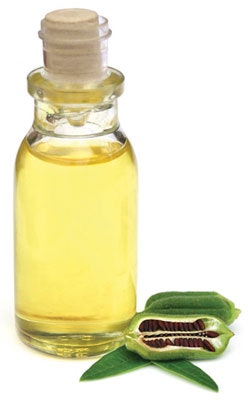
Sesame oil is also the perfect density to be fully absorbed by skin and channel its benefits into the bloodstream, unlike synthetic moisturizers which only penetrate skin’s outer layers. This makes sesame oil a powerful carrier or base oil, often used to dilute and support other oils for massage and other treatments.
Rich in vitamin E, linoleic acids and palmitic acids, and the unique antioxidant sesamol, sesame oil is a potent natural moisturizer and emollient. This wealth of antioxidants promotes the healing of sun and wind damage, and slows the premature aging process by slowing the cell growth and replication process. It soothes and protects skin, serving as a balm for irritation and dandruff, and protecting against the ravages of sun and chlorine.
Some clients might worry about applying an oil to their skin, but sesame oil actually binds dirt, toxins and other oils. An ancient detoxifying method of cleansing involves applying sesame oil to the face, allowing it to rest for 15 minutes, and then rinsing it and all the undesirable compounds it has bound off of the skin with warm water.
Olive Oil
Ancient Greek women were the first to recognize the healing properties of olive oil for the skin and body. Olives contain a high mineral content, along with three major antioxidants: vitamin E, polyphenols and phytosterols. They also contain the rare compound hydroxytyrosol, which helps to block the damaging effects of free radicals. Olive oil’s healing properties are enhanced by oleocanthol, a natural anti-inflammatory. In the Ayurvedic traditions, olive oil is known as a calming oil beneficial for “vata” types.
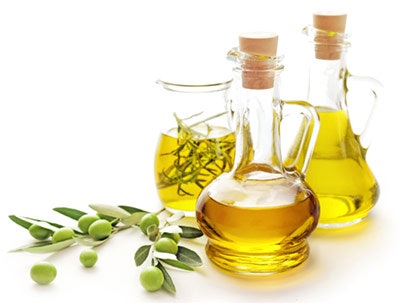
Sacred to the Greeks, this oil is an intensive moisturizer. It supports the healing of eczema and dry, cracked skin, and restores smoothness to maintain healthy, youthful skin. Olive oil also offers antibacterial and antifungal benefits. Mixed with honey and beeswax, olive oil balms have been used since ancient times to treat skin conditions and prevent infections. Olive oil is often a key ingredient in modern organic cosmetics and lotions. Like sesame oil, it penetrates through to the deepest layers of skin and cleanses it of dirt and toxins. To name just a few of its many applications, it is often used for nail and cuticle care, and even as a gentle eye makeup remover. A mixture of olive oil and salt is an effective exfoliant. Adding sugar and lemon creates a soothing scrub for dry or cracked lips.
Sunflower Oil
In Ayurveda, sunflower oil is valued as a lightweight, cooling oil that helps to balance “pitta” and soothe irritation, inflammation, sunburn and acne. Sunflower oil is quickly absorbed into the skin, and is often a good choice for those with sensitivities and allergies. It forms a lightweight but critical barrier over the skin, helping it retain its natural moisture and preserving youthful vitality. This barrier also helps to prevent infection, especially when used on the delicate skin of infants.
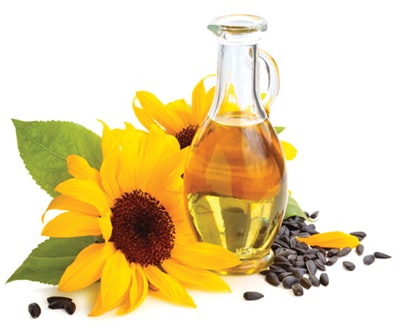
Sunflower oil is richest in linoleic acid, and also contains oleic and palmitic acids, which support its soothing qualities. It is also high in antioxidants, especially vitamin E, which prevents scarring and smoothes wrinkles. The oil’s beta carotene may be converted into vitamin A, which reduces vulnerability to the sun and free radicals. Sunflower oil contains a wealth of beneficial minerals, as well as folic acid, which helps the body to produce new cells and supports skin regeneration.
Safflower Oil
This light oil is known as a great balance to the heaviness of “kapha” in Ayurvedic traditions. Jars of safflower oil have been found in Egyptian tombs, and its use was well known in China and Greece. High in linoleic acid, it contains high amounts of vitamins A, D, K and especially E. Its moisturizing effects can benefit conditions such as psoriasis and eczema, reduce wrinkles, and promote elasticity and vitality. Many synthetic lotions only moisturize skin temporarily and can actually accelerate the aging process. Safflower oil actually increases the integrity of cell membranes. Its natural anti-inflammatory and cleansing properties make it a beneficial choice for people who experience acne.
Mustard Seed Oil
This warming oil is a vital part of Ayurvedic healing, and is part of the ancient mythologies of India, Rome and Greece. It is known to improve blood circulation, skin texture, muscular development and dry skin. Mustard oil promotes “pitta” and penetrates skin deeply. It is an excellent treatment for “vata” nervous system problems and “kapha” inflammation or fluid retention problems. It contains the antioxidants: mustard allyl isothiocyanate, oleic acid, linoleic acid, alpha linolenic acid and eruric acid. The oil contains both flavonoid and carotenoid antioxidants, along with vitamins A, C and K. Its thick consistency and bountiful antioxidants have made it a natural choice for sun protection for thousands of years.
Many of mustard oil’s unique properties come from its sulphur. Sulphur has antifungal and antibacterial properties, and helps to prevent and heal many skin infections. It also stimulates sweat glands and opens pores, encouraging the body to remove toxins. Mustard oil is also widely used to lighten skin. It can reduce unwanted tanning and dark spots while smoothing skin and fighting acne.
Almond Oil
This calming oil has been used by Ayurvedic healers for 5,000 years to treat almost any skin condition and to promote relaxation. It pacifies “vata” and supports all seven tissues in the skin. It is rich in nutrients that support the brain and nervous system, and promote longevity. Almond oil is an excellent moisturizer. It contains linoleic and oleic acid; vitamins A, D, and E; monounsaturated fatty acids; and minerals potassium, zinc and magnesium. Its soothing, anti-inflammatory properties can treat any type of irritated, inflamed skin. They also support healing of minor wounds, chapped skin and other skin infection.
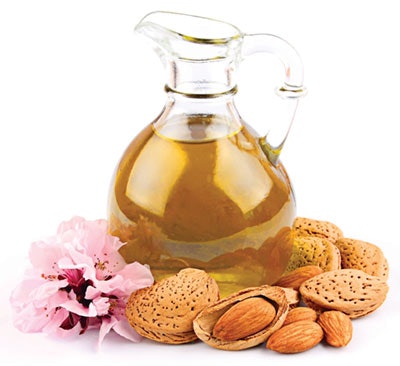
The nutrients of almond oil make it a potent emollient. Unlike synthetic treatments, it is fully absorbed into skin and helps to restore skin’s natural pH balance instead of disrupting it. It also lightens skin, and many enjoy its benefits in treating dark undereye circles. This mild, hypoallergenic oil is often used for baby massage. Its full absorption allows it to cleanse skin of other oils and dirt, and it can be used to remove makeup while keeping skin plump and firm. Its benefits for wellness are more than skin deep. Almond oil boosts the immune system and relaxes muscles when used as a massage oil.
Coconut Oil
This oil is prized by Ayurvedic healers for its cooling benefits. It balances “pitta,” reducing anger, inflammation, and blood pressure while nourishing the mind. Used for the complexion, it promotes suppleness and elasticity. Coconut oil is high in saturated fats that keep skin smooth and help even severely dry skin to retain moisture, as well as proteins that contribute to cell health and tissue repair. It also contains capric and lauric fatty acids, which have strong disinfectant and antimicrobial effects. Coconut oil provides skin with high levels of vitamin E, which heals skin and prevents premature aging. It is absorbed well into both skin and hair, and may be used for shaving, cleansing and removing makeup.
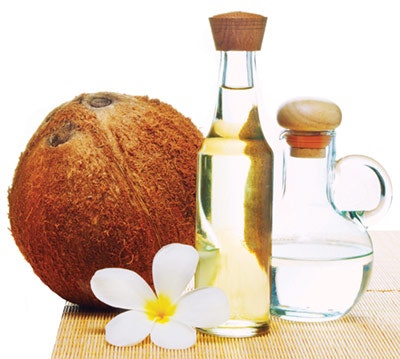
Coconut oil’s soothing properties make it a wonderful choice for exfoliating. Any grainy substance may be added to scrub away dirt and dead skin cells, while the coconut oil calms and rejuvenates the living skin. Its healing and antimicrobial abilities may also help treat skin disorders and promote healthy new tissue. Synthetic cleansers irritate skin and cause it to overproduce oil because they strip away all of the skin’s natural oils. Coconut oil gently washes away dirt and excess oils, but allows the necessary amount of natural oil to remain, promoting clean, soft, healthy skin.
Incorporating Oils
These magical oils can be incorporated into treatment regimens in a spa either through back-bar products that contain them or through house mixed concoctions applied to the skin. They can also be recommended for home care for the client to improve and extend their skin care efficacy.


